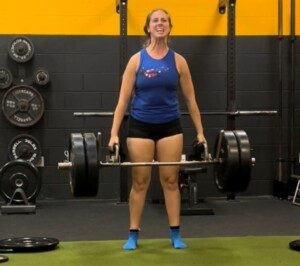Autistic teens need to spend less time playing videogames and more time strength training with weights – including girls.
Yes, that’s right: Teen girls with autism will experience tremendous benefits from working out with weights, also called strength training or resistance training.
These days, nearly every high school has a weightlifting room.
Furthermore, the gym industry is so competitive that there are memberships as cheap as $10 per month.
“Working with weights in a gym helps my anxiety and stress because I focus on just my body,” says Rylee Howerton.
Rylee is 17 and a Russ Berrie Making a Difference Award Honoree for her 4,000 hours of community service over the years, which include serving meals and giving hygiene kits to the homeless during the pandemic lockdown.

Rylee Howarton is seated, end right, with other Russ Berrie Making a Difference Award Honorees.
The teen, who has set her sights on becoming a science teacher for deaf people, was diagnosed with Autism Spectrum Disorder at seven.
She doesn’t let that stop her from competing in beauty pageants.
But her autism may not be the most remarkable thing about her pageantry pursuits.
While other pageant contestants are doing traditional acts for the talent portion, such as singing, dancing or playing a musical instrument, Rylee lifts weights to show her strength and dedication to a traditionally male dominated activity.
The teen, who has a chromosomal disorder that gives her poor muscle tone (but doesn’t cause the autism), actually picks up a barbell on stage, wowing the spectators.
This feels way more natural for her than do the more conventional acts.
And she’s pretty good at it, too, being able to hex-bar lift 240 pounds and Roman deadlift 155 pounds.

Rylee doing the hex bar lift of at least 225 pounds (the plates are 45 pounds each; the bar is 45-55 pounds).
“It helps keep my mind away from things that stress me out like problems or school,” says Rylee, a straight-A student.
“And I can get lost in music that helps motivate me to lift. It’s like a different world.
“And no one looks at me for being alone. Weightlifting doesn’t need more people together to do it.”
If your autistic teen is worried about appearing too solitary, yet strongly prefers being by themselves, strength training is among the most ideal endeavors to embark upon.
“I’m still struggling with making and keeping friends,” says Rylee.
“I’m not really social. I’ve learned to just do what I want to do and not worry about anyone else.
“I wanted to accomplish a certain goal I had set for myself, and I did anything I needed to in order to accomplish that goal too.
“After that point I felt I had power and could be and be anything.”
Training with weights will help autistic teens improve their goal-setting skills.
In fact, this benefit applies just as much to neurotypical teens.
Getting involved with strength training will significantly discourage taking up smoking.
And no, lifting weights will NOT stunt a teen’s growth; but smoking and poor nutrition just might!
A devotion to barbells, dumbbells and resistance equipment will be a mighty incentive for autistic teenagers to make an effort to eat more healthful food and ditch junk food.
And if they have ADHD with their ASD, lifting weights will improve their focus.
Autism Is So Much More than Difficulty Making or Keeping Friends
If autism were simply about being introverted, then half the world would qualify for an ASD diagnosis.
Autism comes with a number of features such as sensory issues, literal thinking and almost always, a need to stim: self-stimulatory behavior such as rocking, tapping one’s face, sniffing one’s hair, handling “fidget toys” and chewing on any number of objects such as pendants made for this purpose.
Autistic people may exhibit mannerisms that present as peculiar to neurotypicals.
They may have a distinct way of speaking or lack of facial expression.
They may avoid eye contact when speaking because it’s distracting while they think about what they’re saying.
They often struggle with small talk or common conversations, yet may talk obsessively about their unusual interests.
These characteristics can lead to being bullied.
Rylee explains that “because lots of girls and even boys bullied [verbally] me for being different, it helped to know if anyone put their hands on me I could protect myself [due to being strong from strength training]. And I had to a couple times.
“I also like to push limits of stereotypes. I think girls need to be seen as equals in sports that are usually just boys.”
Additional Benefits of Strength Training for Autistic Teens
- Greatly helps with weight management.
- Improves neuromuscular coordination.
- Can be a vehicle for competition (powerlifting or physique contests).
- Will enhance self-confidence.
- Can lead to a career in physical fitness.
 Rylee Howerton, who was diagnosed with autism at seven, overheard other children describe her with an offensive word. This inspired her to launch the “Choose Wise Words” campaign, resulting in a children’s book of the same name (written in 2017), and opportunities to speak about kindness and inclusivity to thousands of people. As a high school student, she uses sports and pageants as a platform to share her message. She is a 2023 Russ Berrie Making a Difference Award Honoree.
Rylee Howerton, who was diagnosed with autism at seven, overheard other children describe her with an offensive word. This inspired her to launch the “Choose Wise Words” campaign, resulting in a children’s book of the same name (written in 2017), and opportunities to speak about kindness and inclusivity to thousands of people. As a high school student, she uses sports and pageants as a platform to share her message. She is a 2023 Russ Berrie Making a Difference Award Honoree.
 Lorra Garrick has been covering medical and fitness topics for many years, having written thousands of articles for print magazines and websites, including as a ghostwriter. She’s also a former ACE-certified personal trainer. In 2022 she received a diagnosis of Level 1 Autism Spectrum Disorder.
Lorra Garrick has been covering medical and fitness topics for many years, having written thousands of articles for print magazines and websites, including as a ghostwriter. She’s also a former ACE-certified personal trainer. In 2022 she received a diagnosis of Level 1 Autism Spectrum Disorder.
.



























